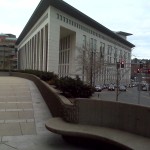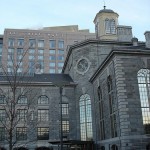Labor and Employment Law Moot Court Team Advances
 I also received news today that our moot court team competing in the Wagner Labor and Employment Law Competition has advanced to the octo-final round. The students on that team are Allison Luczak, Michael Miner, and Jesse Dill, coached by Professors Phoebe Williams and Paul Secunda.
I also received news today that our moot court team competing in the Wagner Labor and Employment Law Competition has advanced to the octo-final round. The students on that team are Allison Luczak, Michael Miner, and Jesse Dill, coached by Professors Phoebe Williams and Paul Secunda.
The Wagner Competition is in its 34th year, and more than 40 teams compete in it each spring. It’s taking place at New York Law School. I am proud that our team is doing so well in this prestigious competition.


